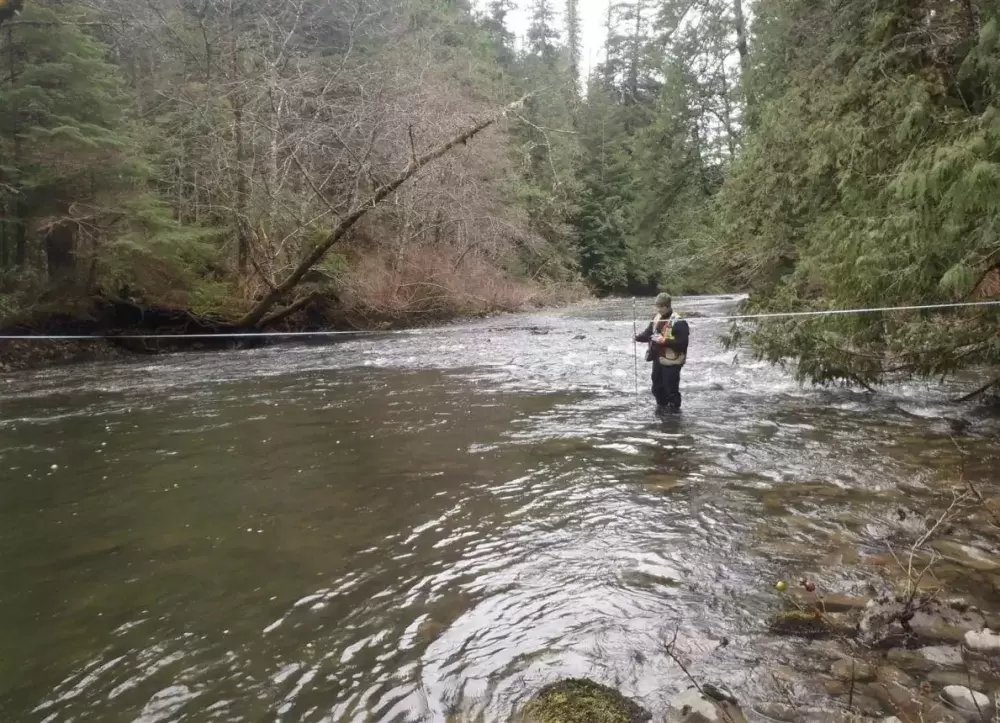The province has failed to live up to its obligation to create an Electricity Purchase Agreement [EPA] with Huu-ay-aht First Nations, according to Chief Elected Councillor Robert Dennis.
On Monday, Dec. 11, Huu-ay-aht Elected Councillor Trevor Cootes sat down with hydro officials in Vancouver to move forward with the Sarita River Hydropower Project, which would see power generated at the site distributed through the existing hydro grid, both to local consumers and beyond.
"There was no signing today. We wanted BC Hydro to agree to go ahead with the EPA," Dennis said. "Quite some time ago, B.C. wrote us a letter saying that reconciliation is a priority for their government. They indicated they were committed to working in partnership with First Nations to develop a joint vision for reconciliation."
Dennis explained that, under the Maa-Nulth Treaty, Huu-ay-aht was allocated a specific water volume on the Sarita for a micro-hydro project. “But now BC Hydro has indicated they won’t sign an EPA with us,” he said. “So never mind reconciling – they won't even live up to commitments that are in the Treaty.”
Dennis said Huu-ay-aht was encouraged to develop partnerships with other jurisdictions and other businesses. But now BC Hydro appears to be unwilling to come to the table.
"We were moving on anticipation that [BC] Hydro was not going to deal with us in good faith. It's unfortunate if we have to start thinking that way. But if they had been dealing with us in good faith, we would have had an EPA a long time ago."
To date, Dennis said, Huu-ay-aht has invested years of time and millions of dollars into the project.
"To me, this is a sign from the province that they are not willing to reconcile some of the issues that are outstanding."
Newly-elected NTC president Judith Sayers said the BC Hydro refusal is part of a pattern of rejections, despite a provincial mandate to create EPAs with B.C. First Nations. Sayers has a long working history with clean energy development. In 2015, she received a Lifetime Achievement Award from Clean Energy BC.
In 2001, as elected chief councillor of Hupacasath First Nation, Sayers issued a proposal to BC Hydro to build a 6.5 megawatt run-of-river power plant on China Creek, in partnership with Synex Energy Resources Ltd, Ucluelet First Nation and the City of Port Alberni.
Ha-Shilth-Sa spoke with Sayers just hours after B.C. Premier John Horgan announced that the controversial Site C dam project would go ahead. Sayers has opposed the project since its inception.
"There's always a hope that the government is going to do the right thing. And that hope was dashed to a billion pieces," Sayers said.
That being said, Sayers said clean energy is a "huge, huge" issue for B.C. First Nations. She noted that the Sarita project would provide a great economic opportunity for Huu-ay-aht.
Her fear is that, with Site C approved, the window is closing for First Nations, including several Nuu-chah-nulth nations, who hope to develop clean energy projects.
"Besides Huu-ay-aht, there are people like Ahousaht, Toquaht and Hesquiaht definitely wanting to go ahead with projects. But there's not going to be a call for power for many years to come. Site C is going to put a glut of power on the grid."
Sayers noted that the B.C. Clean Energy Act requires that the province provide funding for First Nations to produce clean energy.
"But there was nothing in Horgan's announcement about how they would achieve that,” she said. “So First Nations are going to have to fight their way in to find some sort of opportunity.”
Ha-shilth-sa contacted the B.C. Ministry of Indigenous Relations and Reconciliation and the Ministry of Energy, Mines and Petroleum Resources for comment, but was unable to obtain any response by deadline on Tuesday afternoon, Dec. 12. We will provide updates as information becomes available.







